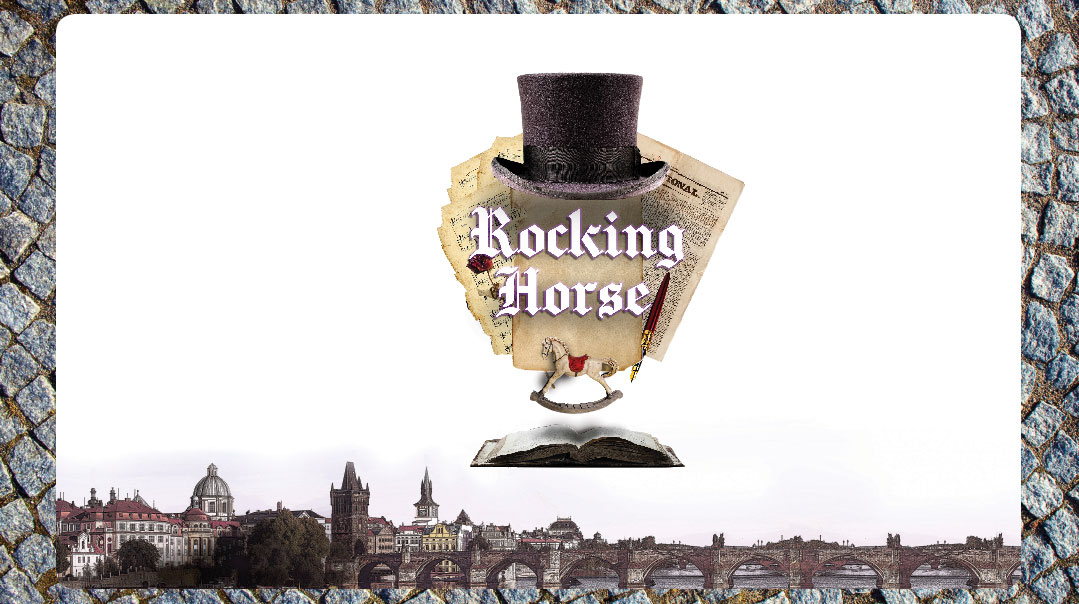Rocking Horse: Chapter 27

“I thought your little girl was going to come to school today,” Becca says. Polite but direct

"Emmy?” Her daughter has fallen asleep. Hannah puts an arm on her shoulder and rocks her gently. Emmy’s eyes flutter open.
“Emmy, dear, I need your help.”
Felix stands at the doorway, his arms crossed, unbelieving.
Hannah throws him instructions: collect firewood, blankets, wine or cognac. It’s been years since she had a baby, decades, and she cannot think of what might be needed, apart from her daughter’s help. He disappears.
Emmy sits up.
“Emmy, you have to get up. I must attend a birth, and I shall need you.”
Emmy rubs her eyes. “Me, Mama? What do I know? Besides, I’m tired.”
She has an urge to shake Emmy. But she takes a second look at her daughter. “You have not been sleeping well. I know that.”
Something in her daughter’s face relaxes.
“But this is important.” She knows her daughter. For all her cossetting and spoiling, at a moment of crisis, she will come through.
Hannah walks over to the bedroom window and lifts the curtain. The wind blows rough, and the rain is almost horizontal. Never mind. She has walked through worse.
She turns back to her daughter. Emmy has slipped back down under her covers. “Don’t they say childbirth is the most natural thing in the world? Why do you need me?”
Hannah turns back and takes in the sight. The white frills are pulled up around Emmy’s chin, so she looks like a little child.
It’s not that the woman has fled her home. It’s not just that she is without family. Without husband, even. It’s that she’s having a baby, and it is on the seam of life that you encounter death, or what looks like death, or what may become death, and it is there that hands, womanly hands, your sisters in this world, join you and first coax, then command, find the strength for life. It is there that a woman, with her compassion and her strength says, it may feel easier, sometimes, to abandon the world, to slip away from the weariness of sorrow. But there is a tomorrow, and it kicks inside your womb, and your job is not just to bring it into This World, but also prepare it for the World to Come. And for that, it will need the safe cradle of a mother’s arms and the vision of a mother’s eyes. So stay with us, be with us, dear sister, even as you dance on the threshold.
She takes a deep breath. “Five minutes, Emmy. I need you downstairs, with your cloak on, in five minutes.”
Becca adjusts the desk, and straightens the small writing book she has placed in the middle.
It might be ambitious.
They will not start writing for a while. But weren’t they always taught that motivation is the most important thing of all. If the little girl sees that she will soon start to write in a notebook that is all her own — brought over from Paris, no less — then surely she will be eager to learn. To grip a pencil and shape her letters.
When everything is perfect, she sits down at her own desk, to wait for her single student. She has chosen her dress carefully. Her hair is swept up in a chignon, no curls around the side, no little braids woven in here and there. Simply the severe hairstyle of a new school teacher.
Ten minutes later, Becca is back on her feet, staring at the window.
Twenty minutes later, she is rearranging the two desks, so that the sunlight falls on them.
Thirty minutes later, she decides that the sun will be too warm, and returns the desks to their original positions.
Forty minutes later, she sits down, places her hands on the table, and leans over, to rest her head on the pillow that they form. May as well get some rest.
Fifty minutes later, she stands, adjusts her skirts, and sweeps out of the room and into the dusty yard. There is no sign of the little girl, her mother, nothing. She turns left, into the narrow alleyway. Bright pink bellflowers cascade down the stone wall and Becca snaps off a sprig. She lift it to her face; the fragrance is sweet and rich. It will be a gift, she decides.
When she reaches the little girl’s house, the door is half open, and Becca hesitates, unsure of whether to simply push it open or knock and wait. There are sounds inside, so she calls out in Ladino, “Is anyone home?”
A moment later, the mother is at the door. Her face is in shadow, and Becca screws up her eyes to read her expression. Surprise, but also — could it be? — fear.
Becca holds out the flowers. “For you.”
The woman hesitates. Becca gives a little smile. The flowers nod slightly in the breeze.
Another long moment of hesitation.
The woman reaches out and takes the flowers.
“May I come in?”
The woman stands to the side, and Becca steps into the dark house.
In the corner of the room, Rahel, her new student, plays with her little brother. They are playing with a handful of dried kidney beans, and she hopes that the little boy will not put any in his mouth. What does this woman know about safety?
They sit in the opposite corner, on two wicker stools. “I thought your little girl was going to come to school today,” Becca says. Polite but direct.
The woman shrugs.
Yesterday, and the day before, she had come to visit the family, to explain the procedures. The day before that, she had sent a letter, on Alliance notepaper. She looks around now. She notices the letter on the table. Her own writing — large and even and well-spaced — has been written around, in a tiny hand. Surely, the woman’s husband, for this woman cannot read or write.
She is puzzled for a moment and then realizes. Of course. She had given them a piece of paper. And paper was, for these people, an expensive commodity.
She bites her lip. What is it, exactly, that they didn’t understand?
In another part of the tiny house, a baby wails. The woman’s sigh seems to sweep through all of her body. The woman doesn’t move. Becca waits. The baby’s wails grow louder. Tension prickles at the base of Becca’s spine. Does the woman not hear? Is she deaf? Does she not care? Will she ever get Rahel out of this dark hole and into the classroom?
“Rahel!” Becca says sharply. “Go and bring the baby.”
The little girl scampers across the room, returns a moment later lugging a large baby — it must be almost a year. Becca holds out her arms, and the baby squirms and wriggles and Rahel staggers, and all the time, the mother just sits. It is this, the slight buckle of a knee, the small death of a mother just sitting, eradicated by her needs and those of all around her, that bring Becca to the decision.
Becca jumps up, plucks the baby out of the girl’s arms, and lifts it up, eye to eye. “You might yell now, but I’m going to see you fed and bathed and cleaned up.” She looks over at the pile of beans in the corner of the room. “And after that, I’m going to teach you how to play.”
Education begins at home, she says to herself. How many times has she heard that aphorism? And where? Her mind goes bounding off into a different continent. Where has she heard it? Who says it? Of course. It was always one of Hannah’s favorite lines. She thinks of Emmy and Felix, and sends them her well wishes, as she places the flowering bough in the middle of the table.
It is not a long labor. Still, but it is long enough for Emmy to be wide-eyed with terror, and Chasya to lose her stoic composure, and for Hannah to lose the feeling that she is with a stranger, and for her to coo and coax, to stroke Chasya’s cheek and place a wet linen cloth on her forehead, and finally, to look in her eyes and say, “All that strength you had until today? Find it. Summon it. It’s all there inside you. Just stop fearing long enough for it to rise.”
Chasya closes her eyes, shakes her head. “What does it help?” she says, a quiet wail.
“Later you can ask questions. For now, just find it. It’s there, it’s inside you. All that strength.”
Her bones are weary. Her shoulders. It’s all pressing down on her: the pain and the fear, both of Chasya and also Emmy, who scuttles around the room, throwing more logs on the fire, adjusting the blankets in the waiting crib, trying to assuage her own nervousness. Chasya squeezes her eyes closed. She has dissolved into a child. It is part of the miracle, Hannah knows. Before a woman’s soul is ready to tend to a baby, she must return to that newborn place of terror and comfort.
A hand reaches out for her own. Chasya. Another hand rests upon her shoulder. Emmy.
And it is there, unsure of whether she is supporting or being supported, that Hannah is filled with the awesome joy of a new beginning.
Ernst is amused, and she doesn’t know why. “Why do you laugh?”
He motions to the yellow sheet she holds in her hands.
“I think it is very magnanimous of you to think about how this can become a pair of curtains for a certain impoverished young mother.”
Hannah runs her fingers over the fabric. “It is like the sunshine, distilled and captured. It will brighten up the place. It is like a mother’s warmth shines through the brightness.”
At the dining room table, Felix looks up from the article he is writing. “Poetic.” He raises his eyebrows. “It could be the subject of my next story. Hans and Bertha make a pair of curtains.”
Ernst shakes his head. “A good story needs drama. A pair of curtains is not quite enough.”
Hannah shrugs. “Unless they were having a special guest, of course. And then you can add the values of welcoming guests.”
Ernst abruptly stands. He walks over to the piano and begins leafing through the pile of sheet music that has accumulated on the lid.
“A guest is a good value, but family comes first. Even before making a pair of curtains.”
Hannah looks over to Felix, but he shakes his head. He doesn’t understand his father’s message either.
She sets aside the fabric and walks over to her husband’s side. “Is there something you would like to discuss, my dear?”
He hesitates. He lifts another score, looks at it, then sets it to the side. “It is very kind and gracious of you to be caring for this young mother. But you have a daughter at home who needs help. And we had a plan.”
“A plan?” She shakes her head, not quite understanding.
Sometimes, his blue eyes scare her. It is like they are mirrors, carefully angled to show what is wrong with her.
“You agreed to take Emmy on a trip.”
“Ah.” Her mind has been so occupied with Chasya — the new baby girl, the exhaustion, finding someone who will care for Leib’le so that the poor woman can rest — that she had forgotten.
“We agreed that it would do her good to visit your parents, in the shtetl.”
Her parents. Her home. Emmy. In one strange swoop, her heart leaps with excitement and sinks with dread.
“I think we should make some firm plans.”
All she can do is nod.
to be continued…
(Originally featured in Family First, Issue 696)
Oops! We could not locate your form.

